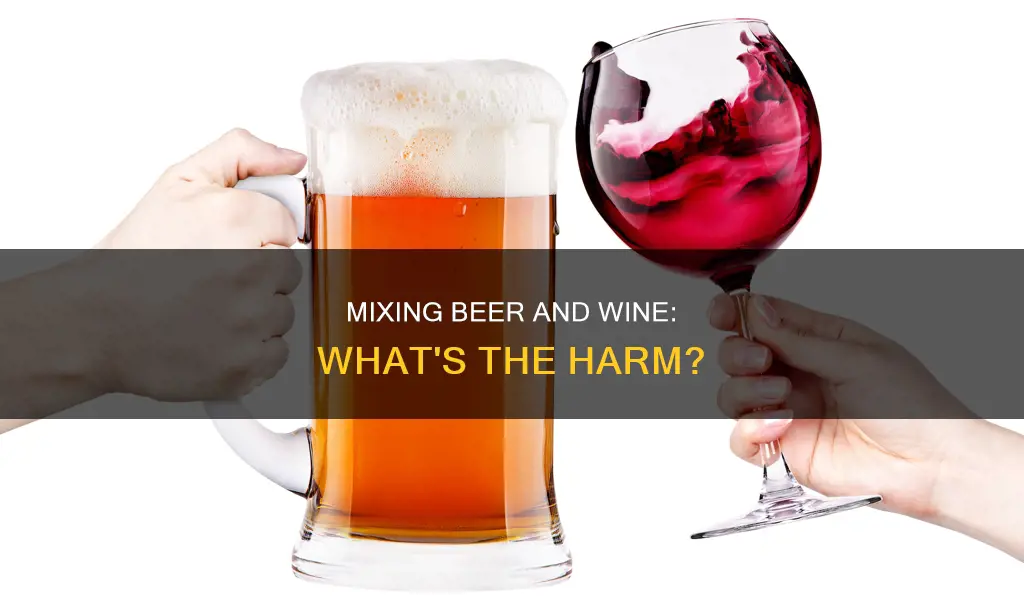
There is a long-standing belief that drinking beer after wine will result in a worse hangover than drinking wine after beer. This idea is summed up in the saying, beer before wine and you'll feel fine; wine before beer and you'll feel queer. However, recent studies have found that the order of drinks does not matter when it comes to hangovers. Researchers at Witten/Herdecke University in Germany and the University of Cambridge in the UK conducted a study with 90 participants between the ages of 19 and 40, where they consumed beer and wine in different orders. The results showed no significant difference in hangover severity based on the order of drinks. Instead, factors such as perceived drunkenness and vomiting were better predictors of hangover intensity.
| Characteristics | Values |
|---|---|
| Can you drink beer after a glass of wine? | There is no evidence to suggest that drinking beer after wine or vice versa will make a difference to a hangover. |
| Folk sayings | "Beer before wine and you'll feel fine; wine before beer and you'll feel queer" |
| Folk sayings | "Beer on wine not so fine; wine on beer, never fear" |
| Folk sayings | "Beer after wine and you'll feel fine; wine after beer and you'll feel queer" |
| Folk sayings | "Grape or grain, but never the twain" |
| Folk sayings | "Bier auf Wein, das rat' ich Dir -- Bier auf Wein, das lass' sein" (German) |
| Folk sayings | "Wein auf Bier, das rat' ich Dir -- Bier auf Wein, das lass' sein" (French) |
| Folk sayings | "Beer before wine makes you feel fine. Wine before beer, never have fear" |
What You'll Learn

Beer before wine, you'll be fine
"Beer before wine and you'll feel fine" is a well-known saying that has been put to the test by researchers from Witten/Herdecke University in Germany and the University of Cambridge. The study, published in The American Journal of Clinical Nutrition, involved 90 German students between the ages of 19 and 40 being given alcoholic drinks in various orders.
The participants were divided into three groups:
Group 1 drank beer first, followed by wine.
Group 2 drank wine first, followed by beer.
Group 3 (the control group) had only beer or only wine.
The researchers analysed how the students felt the next day and whether they had vomited by using a questionnaire and assessing them overnight. They were measured for thirst, fatigue, headache, dizziness, nausea, stomach ache, increased heart rate, and loss of appetite.
The test was then repeated a week later but the order in which each group consumed their drinks was reversed, and the control group drank whichever alcohol they hadn't had the first time.
The hangovers suffered by participants were equally bad, regardless of which form of alcohol they'd consumed and in which order. The researchers also found that factors such as age, weight, and drinking habits did not lead them to predict how bad a person's hangover would be.
The study concluded that drinking too much alcohol will result in feeling bad regardless of what you drink and in what order. So, while "beer before wine, you'll be fine" is a catchy saying, it is not necessarily true. The best predictors of a bad hangover are how drunk you feel and whether you vomit after drinking.
Booze and Workouts: Beer vs. Bourbon's Impact
You may want to see also

Wine before beer, you'll feel queer
"Wine before beer, you'll feel queer" is a common saying that many of us have heard and remembered—but is it true? Well, it turns out that this little rhyme is just a myth.
A study published in the American Journal of Clinical Nutrition set out to test the theory. Researchers from Witten/Herdecke University in Germany and the University of Cambridge gave 90 participants, aged 19–40, alcoholic drinks in different orders to see how it would affect their hangovers. The participants were divided into three groups: the first group drank beer followed by wine, the second group drank wine followed by beer, and the third group (the control group) drank only beer or wine. The test was then repeated a week later, with the first two groups reversing the order of their drinks and the control group drinking the alcoholic beverage they hadn't consumed in the first test.
The results showed that the order in which people consumed their drinks had no significant impact on the severity of their hangovers. Instead, it was found that drinking too much alcohol, regardless of type or order, was the main factor leading to feeling unwell the next day. So, while the rhyme may be catchy, it's not necessarily true!
However, it's important to note that this study only tested the effects of drinking beer before or after wine specifically and did not take into account other types of alcoholic drinks. Additionally, while the order of drinks may not matter, other factors such as staying hydrated, getting enough sleep, and eating a nutritious meal before drinking can help mitigate the effects of a hangover.
In conclusion, while the saying "wine before beer, you'll feel queer" may be a fun rhyme to remember, it's not necessarily accurate. The key to avoiding a hangover is simply to drink in moderation and listen to your body's cues.
Beer After a Colonoscopy: What You Need to Know
You may want to see also

Amount of alcohol matters, not the order
There is a common saying, "Beer before wine and you'll feel fine; wine before beer and you'll feel queer." This implies that the order in which you drink beer and wine matters and will determine how you will feel. However, researchers at Witten/Herdecke University in Germany and the University of Cambridge in the United Kingdom have debunked this myth.
In their study, 90 participants aged 19 to 40 were split into three groups. The first group consumed 2.5 pints of cold lager beer followed by four large glasses of chilled white wine. The second group consumed the same amount of alcohol but in reverse order. The third group, the "control group," drank only wine or beer. The groups were similar in gender, body size, drinking habits, and frequency of hangovers.
The participants were asked to rate their level of drunkenness and rank their hangover symptoms. The researchers found no significant differences in hangover scores among the three groups. It didn't matter whether they drank beer before wine or vice versa; participants reported similar hangover scores.
Jöran Köchling, the study's first author, concluded, "The truth is that drinking too much of any alcoholic drink is likely to result in a hangover." The amount of alcohol consumed, not the order, is what matters when it comes to hangovers. This is supported by Dr. Tarek Hassanein, a specialist at the Southern California Liver Centers, who stated, "The order in which you drink alcohol does not matter because it all reflects on how many grams of alcohol the person is drinking."
So, if you're wondering whether it's okay to drink beer after a glass of wine, the answer is that it's not the order that matters but rather the total amount of alcohol you consume. Drinking responsibly and knowing your limits are the best ways to avoid a hangover.
DayQuil and Beer: A Safe Mix?
You may want to see also

Hangover symptoms
Drinking beer after a glass of wine will not necessarily make a hangover worse. The old adage "beer before wine and you'll feel fine; wine before beer and you'll feel queer" has been debunked by a scientific study. The study found no correlation between hangover symptoms and the order in which participants drank beer and wine. The best predictors of a bad hangover were how drunk the participants felt or whether they vomited after drinking.
Hangovers can vary from person to person, but they generally refer to a set of symptoms that occur after drinking too much. Typical symptoms include:
- Fatigue
- Weakness
- Thirst
- Headache
- Muscle aches
- Nausea
- Stomach pain
- Vertigo
- Sensitivity to light and sound
- Anxiety
- Irritability
- Sweating
- Increased blood pressure
- Diarrhea
- Shaking
Hangovers can be both painful and dangerous. They can impair attention, decision-making, and muscle coordination. Hangover symptoms typically peak when blood alcohol levels reach zero and can last 24 hours or longer.
Beer Mug Package: Disney Cruise's Unlimited Alcohol Offer
You may want to see also

Drinking responsibly
Tips for drinking responsibly:
- Limit your alcohol consumption: Healthy men of legal drinking age should limit themselves to no more than 2 drinks a day and no more than 14 drinks a week. Healthy women of legal drinking age should limit themselves to no more than 1 drink a day and no more than 7 drinks a week. In the UK, guidelines suggest that for both women and men, it's safest not to drink more than 14 units a week on a regular basis.
- Never drink and drive: Always have a designated driver or take public transportation if you plan on drinking.
- Don't drink on an empty stomach: Have a snack or a meal before and while you are drinking. Eating slows the absorption of alcohol into the bloodstream. Bread products and foods high in protein, like milk and cheese, are particularly effective.
- Be aware of how alcohol interacts with medications: Alcohol can affect how your body uses some medicines, making them less effective or dangerous. Always check with your healthcare provider before consuming alcohol if you are taking any medications.
- Be mindful of your family history: If excessive alcohol use or problem drinking runs in your family, you may be at a higher risk of developing an alcohol problem yourself. In this case, abstaining from alcohol may be the best option.
- Schedule drink-free days: Taking breaks from alcohol can help reset your tolerance, improve your sleep, and reduce stress.
- Practise portion control: Choose smaller servings, such as bottles or halves instead of pints, or opt for single shots of spirits with mixers.
- Alternate alcoholic drinks with water or low-sugar soft drinks: This helps you stay hydrated and can reduce your overall alcohol consumption.
- Know your limits: Set a limit for yourself before going out and stick to it. Buying your own drinks instead of participating in rounds can help you stay within your limit.
- Don't drink to cope with stress or negative emotions: Drinking for unhealthy reasons can lead to quicker intoxication and increased side effects.
- Pace yourself: It takes your liver about an hour to process one serving of alcohol. Drinking slowly and spacing out your drinks can help you avoid negative consequences such as blacking out or passing out.
Topsy Beer: Brewing Process and Science Explained
You may want to see also
Frequently asked questions
Yes, you can drink beer after a glass of wine. However, according to a study by the University of Cambridge, drinking too much of any alcoholic drink is likely to result in a hangover.
According to researchers at the Witten/Herdecke University in Germany and the University of Cambridge in the UK, the order of drinks does not matter. Their study found no significant difference in hangover scores among participants who drank beer and wine in different orders.
There are several common sayings about the order of drinking beer and wine, such as "beer before wine and you'll feel fine; wine before beer and you'll feel queer," or "beer then liquor, never sicker; liquor then beer, never fear." These sayings suggest that drinking beer before wine will result in a milder hangover or no hangover at all.
One theory suggests that if you start with wine and then drink beer, the carbonation in beer may cause you to absorb alcohol from the wine more quickly, leading to increased intoxication and a worse hangover. However, the study by the University of Cambridge and Witten/Herdecke University found no evidence to support this theory.
According to the study, the main predictors of a bad hangover are how drunk you feel and whether you vomit after drinking. Individual factors such as age, sex, body weight, and drinking habits did not appear to have a significant impact on hangover intensity.







